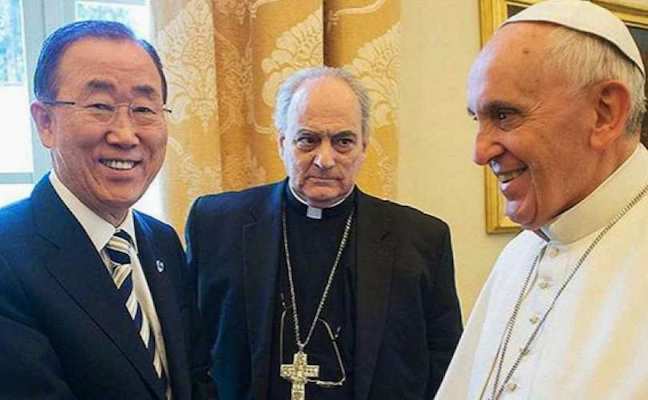Friends, I’m stuck in London – high winds here kept my flight from taking off on time from Rome, which caused me to miss my connection to Washington, which has forced me to seek shelter here in the capitol of England’s green and pleasant land. A not entirely unpleasant development, but one that has cut into my best-laid plans for these reports.
All this notwithstanding, I’ve received information from Rome about Thursday’s press conference at the Pontifical Academy of the Sciences, which brought to a close the controversial workshop on Bioextinction. Not to put too fine a point on it, and to paraphrase T.S. Eliot, “in their end was their beginning.” The statement presented at the press conference essentially says that we set out to examine how the growth in human numbers over millions of years now threatens biodiversity. And then affirms that, indeed, we examined how the growth in human numbers over millions of years now threatens biodiversity. Comparing these boilerplate message would be temps perdu, time better spent elsewhere.
You may however, look at videos of the actual sessions here. I’d hoped to summarize those for you, but situated as I am, that’s not feasible – for now, though I hope to return to this material before long.
So let me keep this brief from my B&B near Paddington Station until a better moment, because, at the very least, I want to vent about a few things, and in a way that I hope adheres to Christian principles and is not merely the usual division into friend and foe, that monopolizes so much of both secular and Catholic discussion these days.
I hear from various sources that Bishop Sánchez Sorondo tries not to get himself crosswise with people who can help his mission. And that’s to the good. So I’d like to offer some advice, and to point to some concrete reasons why many people don’t entirely believe that.
To begin: He’s told the New York Times that criticisms of Vatican positions on the environment are “a ridiculous thing,” and that many of the critics are underwritten by oil companies.

As someone who has been involved in environmental debates for decades (and as many others know in the trenches), I’m sorry to have to say this is the height of hubris. Does the Holy See really believe that its friends at the U. N. have a monopoly on environmental truth? Or on what policies follow from the science? There are tens of thousands of scientists who don’t think so. And we didn’t see them in Rome this week.
But even worse, a high official in the Church – with virtually no knowledge of the individuals about whom he was speaking – has dismissed a large number of people with the claim that they are morally corrupt and have been bought and paid for by sinister economic actors. This is not Christian. It goes beyond hubris to outright calumny. It’s a scandal that a bishop in a highly visible post engaged in such blanket moral judgmentalism about people he would do well to get to know.
And that precisely on the scientific side of what he is doing. The time has passed when the Vatican can invite figures of heterodox orientations without it being noticed by people, lots of people, worldwide. Excuse us Bishop Sánchez, but some of us have studied science and followed for decades the complexities of science/public policy debates. It’s not entirely clear to us why FOUR proponents of population control, not only Paul Ehrlich, but Sir Partha Dasgupta, Peter Raven, and even the Population Council’s Jon Bongaarts were needed in a workshop dedicated to Bioextinction.
Bishop Sánchez has also attacked those of us who raise questions about facts like these as being “against science.” That it’s a “crazy view,” put forward always by the same people. Well, I know some of those allegedly crazy people, who generally get along with their neighbors, raise their families, hold down responsible jobs, are active in their parishes, often work in good universities.
And, perhaps a surprise, don’t entirely agree even with one another because they have different areas of expertise and honestly weigh the evidence about the environment, which they parse in differing ways. As you might expect, because they are not simply ideologues or marching to the drum of the petroleum industry.
And let me put this personally: though many would describe me as politically conservative and critical of alarmist climate models, I keep an eye on the data. And try to carefully assess what the anthropogenic contribution is to climate change – and what can be done about it in a way good both for the Earth and the human race.
But I’ve said enough now, especially given my limited information as I write Thursday evening. I want, however, to close with one final plea.
If institutions like the Pontifical Academy for the sciences really want to be taken seriously by informed Catholics, and not just the Sadducees in UN circles, they need to become more inclusive.
No one cares when the great Steven Hawking comes and argues that some flux in the quantum vacuum gave rise to the universe, which therefore does not need a Creator. That’s both a scientific and a metaphysical discussion worth having on Vatican grounds.
But lots of us care when one slice of the scientific community (and in Ehrlich’s case a figure laughably wrong in his predictions) is given virtual carte blanche at a Vatican event, and on a subject that, as we all know, is at least as much political and social and moral as it is scientific.














